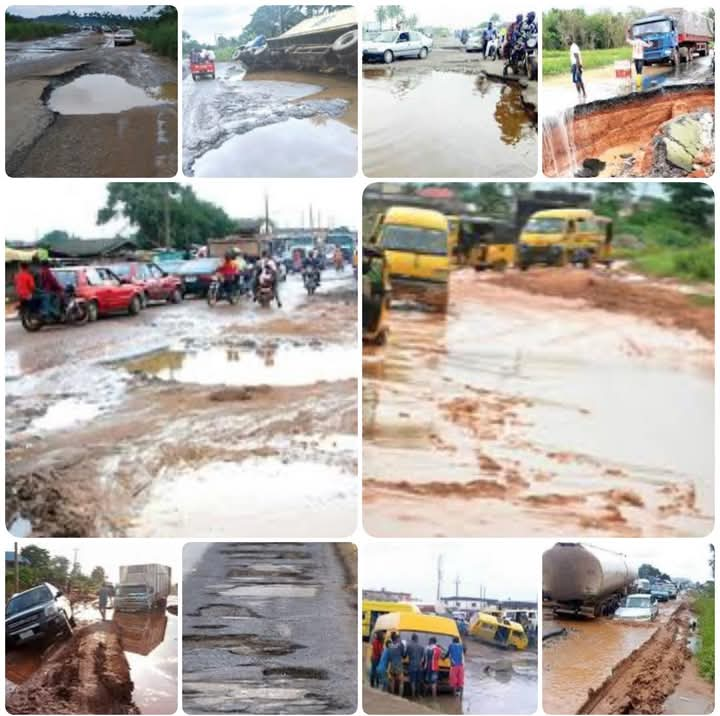By
Otunba (Dr.) Abdulfalil Abayomi Odunowo
Enough is Enough: Fix the Federal Roads in Southern Nigeria Now

For far too long, the federal roads across Southern Nigeria have been allowed to collapse into total disrepair, revealing an alarming neglect that raises serious questions about our governance system. What should be engines of commerce and mobility have now become death traps, wrecking vehicles, claiming innocent lives, and crippling regional economies. The urgency of this situation can no longer be overstated. It is time for us to reflect on the state of our federal highways and, more importantly, to demand action from those tasked with maintaining them.
Take, for instance, the Ijebu-Ode to Ibadan federal road. It stands as a prime example of the negligence that characterizes the state of our infrastructure. This route is crucial not only for daily commuters but also for commercial activities that are vital to the livelihood of many in the region. However, it is now criminally abandoned a shocking paradox that highlights the disjunction between the vital role these roads play and the reality of their condition. Drivers journey along this stretch with their hearts in their mouths, fearful not only of the drastic toll the poor conditions take on their vehicles but also of the imminent danger posed by potholes and crumbling shoulders. Tragically, fatalities occur here almost daily, leaving grieving families in their wake and devastated businesses struggling under the burden of collapsed supply chains.
The plight of the Ijebu-Ode to Ibadan road is mirrored in the experiences of many others across Southern Nigeria. Every state Oyo, Osun, Ekiti, Delta, Edo, Enugu, Ondo, and Anambra seems to share a common narrative steeped in neglect. From massive potholes that resemble craters to flooded sections that turn roads into rivers during the rainy season, these federal highways have become marred by sheer abandonment. Impassable bridges, which used to connect communities and foster economic growth, now impose unwarranted economic hardship on residents and businesses alike.
In light of these grave concerns, we must ask an important question: What has the Ministry of Works delivered in Southern Nigeria in the last two years? Are there any projects to show for that period, any tangible evidence of an effort to rectify this crisis? If such projects exist, let them be brought to light for scrutiny and accountability. However, if none can be identified, then we must unambiguously declare that this failure is unacceptable and it must be corrected now.
We face a critical juncture that calls for a collective awakening and a rallying demand for equity and accountability. The people of Southern Nigeria deserve roads that are safe, functional, and federally maintained. We witness significant infrastructure investments in other regions, and it is high time that the federal government extends the same consideration to the South. It is unacceptable for the infrastructure that supports our daily lives and economic activities to be relegated to a second-class status simply because of regional neglect.
Moreover, the ramifications of this infrastructural decay extend far beyond just transportation. It affects education, healthcare access, and the overall quality of life for citizens. Children struggle to commute to school, patients are delayed in reaching medical care, and businesses face mounting logistical challenges. The decay of our roads inevitably leads to a diminishing quality of life, one that trends downward as the very fabric of our society continues to fray.
The hourglass of patience has run dry, and we can no longer tolerate excuses or procrastination. The cries for help from the people of Southern Nigeria must resonate loudly enough to reach those in positions of power. It is imperative that the federal government prioritizes the urgent repair and maintenance of federal roads, steering consistent funding, resources, and attention toward this critical issue.
Let us point the spotlight on this disgrace, as we insist on becoming agents of change. No more delays. No more excuses. The time to fix these roads is now. Our people’s lives, livelihoods, and future hinge on our collective action and the commitment of those in governance to reinvest in the infrastructure that underpins our existence. In the interest of justice, safety, and progress, let us rise and demand: Enough is enough!
**E-Signed**
Otunba (Dr.) Abdulfalil Abayomi Odunowo is a public policy analyst, engineer, and the National Chairman of the Asiwaju Ahmed Tinubu Support Group (AATSG). He writes from Lagos.

